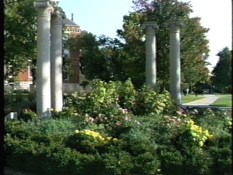DePauw Receives Largest Gift in its 160-Year History
May 16, 1997
 May 16, 1997, Greencastle, Ind. - DePauw University announced today the largest gift in its history, a gift of more than $30 million from trusts established by Philip Forbes and Ruth Clark Holton. Mr. and Mrs. Holton requested that the University use their gift to provide permanent underwriting for scholarships.
May 16, 1997, Greencastle, Ind. - DePauw University announced today the largest gift in its history, a gift of more than $30 million from trusts established by Philip Forbes and Ruth Clark Holton. Mr. and Mrs. Holton requested that the University use their gift to provide permanent underwriting for scholarships.
Both Mr. and Mrs. Holton were members of DePauw's 1929 class. Ruth Clark Holton died April 10. Her husband preceded her in death April 30, 1995.
The Holtons lived in Indianapolis and Naples, Florida. Mr. Holton began working for the Inland Box Company (later Inland Container Corporation) as a DePauw student in 1925 and continued following graduation from the University of Illinois. He moved through the ranks of the company, becoming president and chief executive officer in 1963, vice chair of the board of directors in 1970 and retiring in 1975.
DePauw President Robert G. Bottoms announced the gift will be maintained as part of the university's permanent endowment and known as the Ruth Clark and Philip Forbes Holton Memorial Fund. The Holtons requested that the university use the fund's income to provide scholarships for DePauw students "of high character with academic and leadership" potential. Believing Midwest values were distinctive, the Holtons asked that preference in awarding the Holton Scholarships be given to students from Indiana, Illinois, Michigan and Ohio.
"The university is committed," President Bottoms said, "to identifying Holton Scholars who will be leaders in their careers and communities during the next century and offering them the DePauw experience which has proved so powerful for the past 160 years."
In a letter describing the reasons for the gift they would make through their estates, the Holtons wrote: "In making these arrangements and suggestions, we evidence our conviction that an educated leadership group is, in the final analysis, the greatest of our national resources. Funds spent in procuring educational opportunities for students with the potential to provide such leadership are the expenditures from which the future prosperity and well being of the nation must come."
DePauw Board of Trustees Chair Ian M. Rolland, chairman and chief executive officer of Lincoln National Corporation in Fort Wayne, and Timothy H. Ubben, managing director of Lincoln Capital Management in Chicago and chairman of "The Campaign for DePauw: Leadership for a New Century," issued the following statement on behalf of the board: "This magnificent gift comes to the university at a critical time when we are engaged in an intensive, $153 million campaign, the priority goal of which is student scholarships. The Holtons' gift brings the total of gifts and commitments to the campaign, announced only last October, to more than $114 million. In response to this gift, we trustees re-commit ourselves to fulfilling the objectives of this campaign and realizing the vision we hold for the university."
"In 1919 Edward Rector made a historic gift for scholarships that has shaped this university and helped educate thousands of leaders for our country," President Bottoms said. "I believe the gift of the Holtons will create the same impact for DePauw in the 21 st century that Mr. Rector's gift did in this one."
The campaign aims, President Bottoms said, " ... both to sustain the traditional strengths of DePauw and to enable it to move forward to a new level of service." The Holtons' gift, he continued, " ... gives the DePauw family confidence that this campaign can go beyond meeting the university's immediate needs and enable DePauw to claim a place among the first rank of the nation's liberal arts colleges."
When the Holtons' gift is completed, DePauw's endowed resources for support of faculty and students will approach $250 million, placing it high in the company of top-ranked national liberal arts colleges.
A resolution adopted by the board of trustees described the Holtons' gift as " ... a demonstration of their faith in the significance of the DePauw experience to its students and to their future contributions to society."
Back